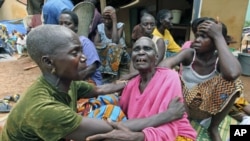Ivory Coast's new government is working to convince refugees to return home after fleeing the violence of this year's political crisis. Many of those refugees, though, remain concerned about their security, where they will live on their return home - and if they will even have homes to which they can return.
More than 400,000 Ivorians remain displaced by the conflict that followed last November's presidential election. Most are in camps in western Ivory Coast and across the border in Liberia. Though that number is down from about one million at the height of the conflict, the remaining refugees present the greatest humanitarian challenge to the new government of President Alassane Ouattara and its aid partners.
In the north, camps on both sides of the border are emptying as civilians who support the president have returned home in large numbers. But in the south, ethnic Guere who backed former president Laurent Gbagbo are more reluctant to leave the safety of their camps because they say they are afraid of pro-Ouattara militants.
Father Cyprien Ahoure is the priest in charge of the Catholic mission in the southern Ivorian city of Duekoue, which currently holds 3,000 refugees who are not expected to leave any time soon.
Father Ahoure said they are trying to reassure refugees, but the Ivorians have just emerged from a traumatic war and others still have ill intentions. He added that the mission needs to prepare a new site because people want to move there. Right now, every room is occupied, he said, and so is the entire courtyard.
Crowded camps, thoughts of home
In these crowded spaces, there is a lot of talk among the displaced about what is happening back home. Ahoure said there have been rumors that the camps will be closed by the government and people forced to return, but stressed that they are only rumors.
Ahoure said that for the time being, mission workers are there to help. He has not received any information, but said that when he does, the mission will act accordingly. For now, he said, it cannot ignore the plight of the displaced.
Mathieu Babaud Darret, Ivory Coast's minister in charge of ex-combatants and war victims, said the government will not close those camps, and said efforts are underway to improve relations in some of the most contentious areas through a Dialogue, Truth and Reconciliation Commission.
Darret said the most difficult part is not rebuilding homes, but educating the people. He said the first thing is that refugees have to agree to return. Then their local population has to be willing to accept them. Darret said the Ouattara government does not intend to force them to return home, preferring instead to show them that peace is possible.
Government help toward reconciliation
The Ivorian government would like to see all refugees return home by the end of the year. Death and rape are not easily forgotten, however, especially when refugees believe many of the perpetrators are part of the new national security force.
This is where the international aid community says the new government must step up and help reconcile political and ethnic adversaries.
For reasons of misinformation, genuine concern, or both, the process is slow, according to Gaelle Bausson from the British charity Oxfam.
"Our research found that most people actually really want to go home, they want to get back to normal, they want access to their land. They want to get back their assets. What's preventing them from doing that is the perception that their security is not necessarily guaranteed - though there's been a major improvement in the security overall. But there are still allegations of arbitrary arrests, harassment, a lot of racketeering by armed men,” said Bausson.
Additional money needed
The United Nations says more funds are needed quickly to improve conditions before they escalate. So far, only one-third of the $292 million target has been raised. Bausson said aid workers in western Ivory Coast are making the most with what they have.
"We are only focusing on the needs of the very most vulnerable because we don't have the means to cover the entire needs that we've identified. About 30,000 people, families, had their house destroyed or burned down," said Bausson. "But in fact, right now, we only have funding for 1,300 houses. And we're asking, the entire aid community is asking for at least funding for 6,000 houses that have been identified as the households that are really vulnerable, and won't be able to rebuild their lives if they're not helped.”
Even if security can be restored, Bausson said livelihoods often cannot. More than 15,000 refugees have lost their sources of revenue, either through the destruction of their businesses, or the inability to access their lands.
Refugee Crisis Challenges Ivorian Government, Aid Workers
- By Nick Loomis




